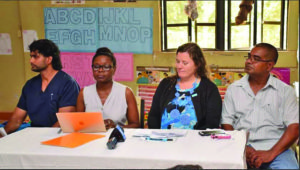There is no doubt that teenage pregnancy in Guyana, which ranks second highest in Latin America and the Caribbean, is at its highest in remote hinterland communities.

Acknowledgments are due to the Ministry of Public Health (MPH) as the community of Mahdia, the administrative centre of Region Eight (Potaro-Siparuni), will now have access to Community Parenting Support Groups, Adolescent Antenatal Clinic Days, Adolescent Health and Wellness Days, and a Men’s Health Clinic.
Last week, at the launch of ‘Adolescent and Men-Friendly Health Programme’ at the Mahdia Health Centre, Deputy Chief Medical Officer Dr. Karen Gordon-Boyle reported during her presentation that the probability of teenage pregnancy in Guyana is 97 per every 1000 teenage female — the second highest in Latin America and the Caribbean.
According to Dr. Boyle, statistics have shown that poverty and other pressing issues in education and health which plague hinterland regions — compounded by the very remote geographical locations of some hinterland communities — are the principal factors which propel the cycle of this phenomenon.
If one is to get into detail, local studies have revealed that one in every five Amerindian teen falls victim to teenage pregnancy, as does one in every four poor teen compared to one in every ten born to middle class households. Taking these findings into consideration, Boyle said it is now to decide how the health of teenagers born to contrasting conditions can be balanced.
Logically, this issue can be targeted at the root by improving the quality and availability of health services in the hinterland communities with the implementation of targeted training that has an accent on adolescence.
Having a readily available and accessible health care programme at the Mahdia Hospital, the Ministry hopes that teenagers would utilise the services of same through education and the proper use of resources made available to protect themselves.
Meanwhile, UNICEF Representative Sylvie Fouet explained that adolescence can be a period of challenges and vulnerability, therefore access to youth-friendly services are critical in this regard. In partnering with the Ministry of Public Health, the main aim is to give young mothers and fathers the access to knowledge and information skills.
Men’s Health Coordinator Dr. Dennis Bassier explained that menfolk will benefit from counselling and therapy sessions. He highlighted that there are cases of men not fully comprehending the dangers of teenage pregnancy, and how to care for their newborn babies.
“We will provide counselling with them along with their partners, to let them understand what happens,” Dr. Bassier said.
Further, Medical Officer of the Mahdia District Hospital, Dr. Badel Baksh, highlighted that the area faces challenges as it relates to teenage pregnancy, since many teenagers practise experimentation, whether it be with drugs or sex.
“There is the need for much sensitisation. Hopefully, at this forum we will be able to break the cultural barrier with this population, and they can know that this is the place to come for all their problems. Health is everybody’s business, and we must look out for each other,” Dr. Baksh said.
Other issues which arose at the launch were concerns of incest and inter-generational sex, which are prevalent in these regions. Dr. Boyle believes that while men have a crucial role to play in disapproving inappropriate relationship practices, they are often the offenders.
Such behaviour exposes both parties to sexually transmitted diseases (STDs) and HIV/AIDS, the levels of which are quite high in hinterland regions.
Dr. Boyle proposed that men must start to value their health, so they can be advocates in the fight against these dangerous occurrences.
Touching on the role of parents, Dr. Boyle said that parents should become comfortable addressing the topic of sex themselves, therefore making it easier to talk about same with their children; who, often in absence of such, resort to experimenting on their own upon the ill-advice of peers.
Mahdia Health Centre is now male friendly with a staff of 12 nurses, doctors and community members who have undergone training under the Ministry of Public Health. This programme was made possible by collaborations between the Ministry of Public Health and the United Nations Children’s Fund (UNICEF), which assisted in the area of capacity building of the community through education and donations.
The Ministry of Public Health is seeking the support of the Ministry of Social Protection and other stakeholders to ensure that Guyana’s hinterland teenagers can be protected through education, and be able to access protection materials while having the opportunity to be reintegrated into society.
The media is also being relied upon to deliver the critical message.



